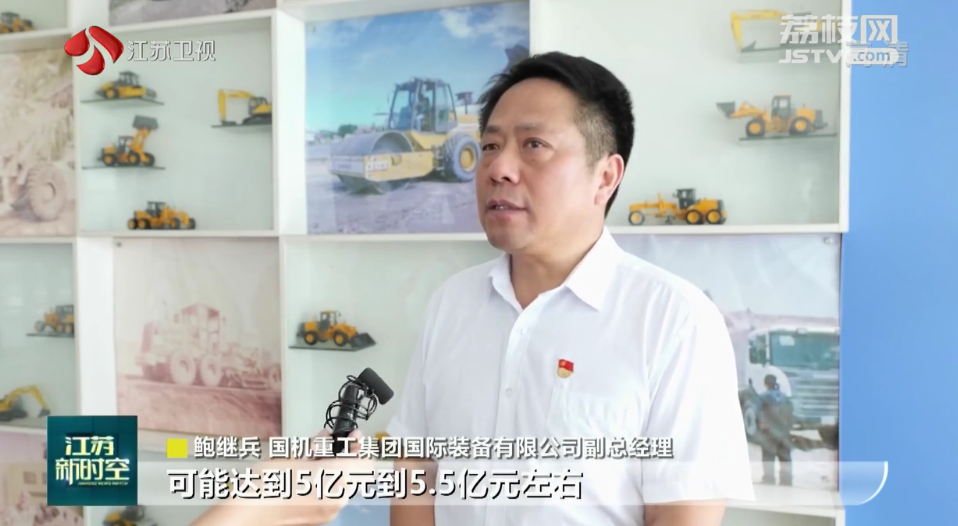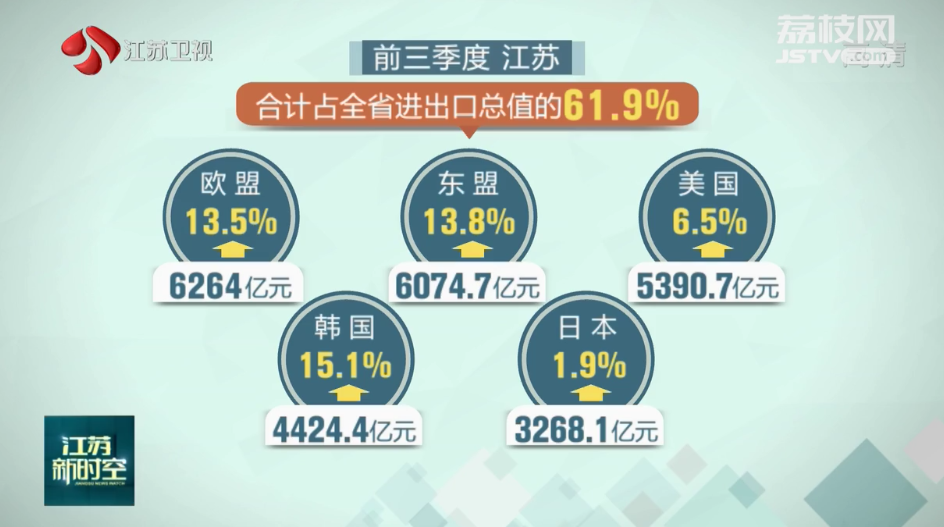In the first three quarters, east China’s Jiangsu province reported moderate import and export growth and maintained strong development resilience by overcoming the pressure of complex and severe external environment and repeated impacts of the COVID-19 pandemic.
According to the statistics of Nanjing Customs, Jiangsu reported a total of 4.11 trillion yuan in imports and exports in the first three quarters, up 9.8% year on year, accounting for 13.2% of the national total. Jiangsu reported exports of 2.61 trillion yuan, up 12.9% year on year and imports reached 1.5 trillion yuan, up 4.9% year on year.
While maintaining a good growth momentum, Jiangsu’s foreign trade is characterized by a significant increase in autonomy, continuous release of endogenous potential, improvement of openness and sharing, and rapid growth of new momentum.

Changzhou-based Sinomach International Equipment Co., Ltd. recently rolled off the production line the second batch of 25 large excavators exported to Argentina.
In the face of the complex and changing international situation, the enterprise has successfully developed new products such as electric loaders and electric excavators and won the favor of foreign customers.
Under the guidance of government departments, the enterprise tried cross-border e-commerce, received orders through online livestreaming and cloud exhibition, and obtained orders worth more than 10 million yuan in just half a year, so as to have successfully expanded new markets in the Far East and Latin America.

Bao Jibing, Deputy General Manager of Sinomach International Equipment Co., Ltd., told the reporter that from small equipment to large equipment, as well as the after-sales accessories, they can improve their sales to a certain extent. This year, combined with online and offline sales, the export value may reach 500 million yuan to 550 million yuan.
Since this year, Jiangsu has introduced 12 specific measures to stabilize the supply chain of the foreign trade industry chain, increase fiscal, tax and financial support, and organized more than 5000 foreign trade enterprises to participate in online and offline exhibitions and matchmaking meetings and operate 1471 China-Europe express freight trains, a year-on-year increase of 17%.
In the first three quarters, Jiangsu’s general trade of import and export amounted to 2.36 trillion yuan, up 11.1%, accounting for 57.4% of the province’s total import and export value.
For emerging businesses such as cross-border e-commerce, various regions have introduced a number of measures to help enterprises carry out Internet-based import and export.
Suzhou launched in September the export overseas warehouse model of cross-border e-commerce special areas. Enterprises can apply for export tax rebate as long as they send goods to the comprehensive bonded area, which greatly improves the capital turnover efficiency of enterprises.
Nantong built a government unified insurance platform for export credit insurance of small and medium-sized enterprises to provide basic export credit guarantee for enterprises with an annual export volume of less than 30 million dollars. The government will pay the bill to reduce the loss of foreign exchange collection, recover overseas receivables, expand financing channels, and help enterprises boost confidence and cope with challenges.

Liu Minsong, Director of Nantong Office of China Export and Credit Insurance Corporation said in the interview that this year, they have increased their support for cross-border e-commerce in new business types. The proportion of export compensation paid to cross-border e-commerce enterprises has increased from 80% to 90%, and the amount of compensation for the entire policy has also increased to 400000 dollars.

Driven by a number of initiatives, Jiangsu reported significant increase in import and export volume to the EU, ASEAN and the United States in the first three quarters. Jiangsu also reported 1.09 trillion yuan in its import and export to “the Belt and Road” countries, up 14.9% year on year. The province’s import and export to Latin America and Africa grew faster than the entirety.
The import and export of private enterprises reached 1.62 trillion yuan, up 15% year on year. Private enterprises promoted the import and export growth by 5.7 percentage points, becoming the leading driving force for foreign trade growth.
Jiangsu will also grant loans to more foreign trade enterprises, strengthen the support of policy tools, continue to promote enterprises to participate in online international exhibitions, support the export of new energy vehicles, and arrange 50 million yuan to support the development of cross-border e-commerce comprehensive demonstration areas and market procurement trade, so as to ensure the completion of the task of stabilizing foreign trade throughout the year.





